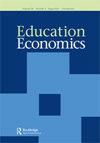美国西班牙裔美国人的教育-职业不匹配与社会网络:公民身份的作用
IF 0.9
Q3 Social Sciences
引用次数: 0
摘要
利用2016-2017年美国社区调查中受过大学教育的西班牙裔美国人的样本,我们研究了潜在的社会网络在美国西班牙裔美国人教育-职业不匹配中的作用。为此,我们使用了一种新的数据驱动指数来衡量教育-职业不匹配的程度,而潜在的网络是使用MSA水平的西班牙裔美国人的份额来衡量的。我们发现,网络提高了受过大学教育的西班牙裔美国人的就业匹配质量,当网络中有大学学位的西班牙裔美国人的比例时,对西班牙裔美国人的影响要大得多。我们的研究结果对其他教育不匹配的指标也很稳健。本文章由计算机程序翻译,如有差异,请以英文原文为准。
Education-occupation mismatch and social networks for Hispanics in the U.S.: role of citizenship
Using a sample of college-educated Hispanics from the 2016–2017 American Community Survey we examine the role of potential social networks on the education-occupation mismatch for Hispanics in the U.S. To do this, we use a novel data-driven index to measure the degree of education-occupation mismatch, while potential networks are measured using the share of Hispanics at the MSA level. We find that networks improve job-match quality for college-educated Hispanics, with effects that are significantly larger for Hispanic citizens when networks consist of the proportion of Hispanics with college degrees. Our findings are robust to other indices of education mismatch.
求助全文
通过发布文献求助,成功后即可免费获取论文全文。
去求助
来源期刊

Education Economics
EDUCATION & EDUCATIONAL RESEARCH-
CiteScore
2.00
自引率
8.30%
发文量
38
期刊介绍:
Education Economics is a peer-reviewed journal serving as a forum for debate in all areas of the economics and management of education. Particular emphasis is given to the "quantitative" aspects of educational management which involve numerate disciplines such as economics and operational research. The content is of international appeal and is not limited to material of a technical nature. Applied work with clear policy implications is especially encouraged. Readership of the journal includes academics in the field of education, economics and management; civil servants and local government officials responsible for education and manpower planning; educational managers at the level of the individual school or college.
 求助内容:
求助内容: 应助结果提醒方式:
应助结果提醒方式:


